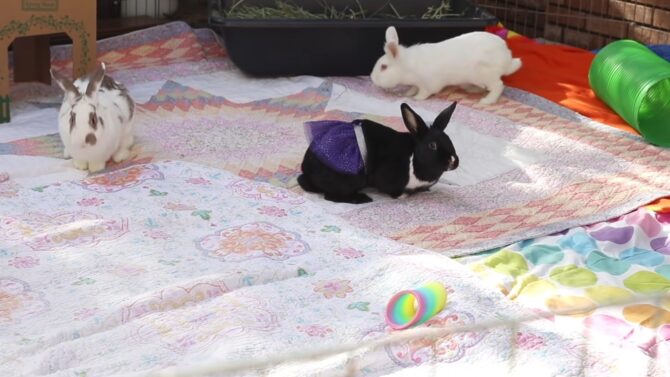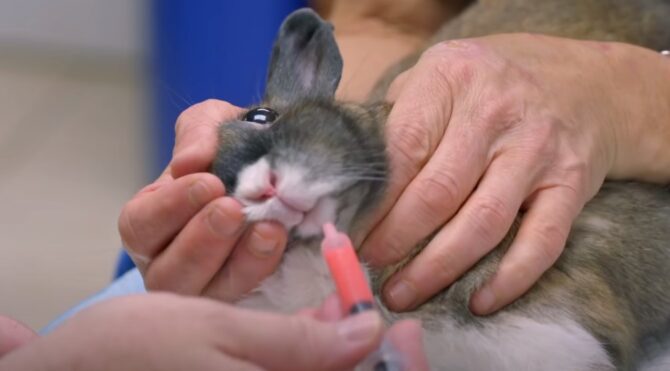Rabbits, especially domesticated ones, have long been a popular choice for pets. They’re cuddly, cute, and generally easy to care for. Who wouldn’t want to have one, right?
But, like all animals, they come with their own set of unique physiological quirks.
One of the most commonly asked questions is whether female rabbits have periods. This topic is intriguing not just for bunny owners but for anyone interested in the reproductive systems of animals.
Rabbit Reproduction

When we discuss the reproductive cycle of bunnies, it’s essential to understand the basics. They have a fascinating and unique reproductive system, different from many other mammals.
Estrous vs. Menstrual Cycles
The reproductive cycles in mammals can primarily be categorized into two types: the estrous cycle and the menstrual cycle. Most mammals, including bunnies, undergo an estrous cycle.
During the estrous cycle, if no fertilization occurs, the body reabsorbs the endometrial lining instead of shedding it. Thus, animals in estrus don’t have a period like humans do.
On the other hand, primates like humans experience a menstrual cycle. This cycle involves the shedding of the uterine lining if fertilization doesn’t occur. This shedding is what’s commonly referred to as a period.
Unique Rabbit Cycle
Bunnies are induced ovulators. This means that they don’t have a regular cycle like humans. Instead, ovulation is triggered by the act of mating.
When a female rabbit (doe) is in the mood to mate, she will often exhibit specific behaviors, but this doesn’t equate to the menstrual periods experienced by humans.
Common Misconceptions

Understanding reproductive cycles is complex, and this has led to numerous misconceptions.
“Spotting”
Some owners might occasionally notice spots of blood and wonder if their pet is having a period. However, this isn’t related to menstruation.
Spotting could be due to a urinary tract infection, injury, or other health issues, all of which require attention. If you ever notice blood or any other unusual discharge from your bunny, it’s crucial to consult with a veterinarian.
It might be an indication of a severe underlying issue.
Behavior Changes
Another misconception is that behavioral changes, like aggression or moodiness, are linked to a doe’s “cycle”. While it’s true that they can exhibit behavioral changes when they’re ready to mate, it’s not akin to premenstrual symptoms in humans.
Such behaviors are natural displays of their willingness to mate and shouldn’t be confused with menstruation.
Health Implications
While does don’t have periods, their reproductive system has unique health considerations that pet owners should be aware of.
Risk of Uterine Tumors
Unfortunately, female rabbits are prone to uterine tumors. As they age, the chances of developing these tumors increase. This is a compelling reason why many veterinarians recommend spaying does.
By spaying, you not only prevent potential offspring but also significantly decrease the risk of uterine diseases and related complications.
Benefits of Spaying and Neutering
Beyond the health benefits for female rabbits, spaying and neutering can lead to more docile pets, reducing unwanted litters and territorial behaviors.
Spayed and neutered bunnies are also easier to litter train and are less likely to spray or mark territory.
Rabbits breed prolifically. By being responsible and considering spaying or neutering, you can help control the pet population and ensure a happier, healthier life for your furry friend.
Importance of Veterinary Care

Regular veterinary care is crucial for any pet, and bunnies are no exception. Understanding their reproductive health is an integral part of this care.
Routine Check-ups
A routine veterinary check-up is essential to ensure the overall well-being of your bunny. The vet will typically check its weight, teeth, fur, and more.
Additionally, regular check-ups can catch potential reproductive issues early, like the aforementioned uterine tumors.
If any abnormalities are found, early detection can make treatment more effective, increasing the chances of your rabbit leading a healthy, long life.
Addressing Reproductive Health Issues
While does don’t menstruate, they can still face other reproductive health issues. Endometritis, which is inflammation of the uterine lining, is one such issue.
By maintaining regular vet visits, these conditions can be diagnosed and addressed promptly.
Rabbit Reproduction vs. Other Animals

While understanding bunny reproduction is fascinating on its own, seeing it in the broader context of the animal kingdom can be even more intriguing.
Bunnies vs. Rodents
Many people assume rabbits are rodents, but they’re not. They belong to the Lagomorpha order. One distinction is that bunnies produce two types of feces, while rodents produce only one.
In terms of reproduction, rodents, like mice, have a more predictable estrous cycle than rabbits.
Bunnies vs. Larger Mammals
Larger mammals, like cows and horses, also have estrous cycles. However, the duration, frequency, and signs can be considerably different for rabbits.
For instance, horses have a more prolonged estrous cycle, with clear physical and behavioral indicators.
Fascinating Facts
There’s always more to learn, especially when it comes to the intricate world of reproduction. Here are some interesting tidbits about bunny reproduction.
Prolific Breeders
The phrase “breed like rabbits” didn’t come from nowhere. A single pair of bunnies can produce as many as 40 offspring in a single year if left unchecked.
This reproductive capability is one reason why controlling the rabbit population, especially in non-native areas, is essential.
Delayed Implantation
Bunnies can exhibit a phenomenon known as delayed implantation. After mating and fertilization, the embryo might not implant into the uterine wall immediately.
This delay allows the mother to give birth during more favorable conditions, showcasing the adaptability of rabbit reproduction.
Key Takeaways for Bunny Owners
With all this information in mind, let’s consider some essential points for rabbit owners and enthusiasts.
Educate Yourself
The more you know, the better you can care for your pet. Understanding rabbit reproduction allows owners to make informed decisions about their pet’s health.
Share this knowledge with other owners to ensure the well-being of these furry friends everywhere.
A Healthy Bunny is a Happy Bunny
Prioritizing your bunny’s reproductive health ensures a longer, happier life for them. Regular vet visits, considering spaying/neutering, and being vigilant about any signs of distress are all crucial aspects of rabbit care.
FAQs:
Can does become pregnant immediately after giving birth?
Yes, they can become pregnant again almost immediately after giving birth. It’s possible for them to be nursing one litter and simultaneously be pregnant with another.
How long is their gestation period?
The gestation period, or the time it takes from conception to birth, typically ranges from 28 to 31 days, with an average of around 30 days.
Is there a noticeable difference between a male and female rabbit’s reproductive behavior?
Yes, males and females exhibit distinct reproductive behaviors. Males, or bucks, often show territorial behaviors, like marking, and may become more aggressive when they sense a receptive female.
Females, or does, can become more aggressive when in heat, and they might dig or create nests when they’re preparing to give birth.
How can I tell if my bunny is pregnant?
Determining pregnancy can be a bit challenging, especially in the early stages.
However, some signs might indicate pregnancy, such as weight gain, mood changes, and nest-building behaviors, and, in later stages, palpating the abdomen might reveal small lumps (baby rabbits). A definitive diagnosis is best done by a veterinarian.
Are there any complications that can arise during pregnancy?
Just like any other animal, rabbits can also face pregnancy complications. Some potential issues include miscarriage, dystocia (difficulty giving birth), or the reabsorption of the fetuses.
Regular check-ups and monitoring during pregnancy can help in identifying and addressing any complications early on.
The Bottom Line
As we’ve explored, female rabbits exhibit a unique set of reproductive behaviors and characteristics that distinguish them from other animals.
The fact that they don’t have periods like humans might be surprising to many, but it’s just one of the myriad ways nature showcases its diversity.

